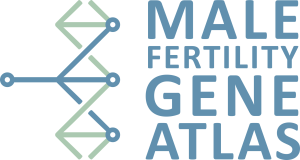[PREPRINT] Biallelic mutations in M1AP are a frequent cause of meiotic arrest leading to male infertility
Margot J. Wyrwoll,<sup>1,#</sup> Şehime G. Temel,<sup>2,#</sup> Liina Nagirnaja,<sup>3</sup> Manon S. Oud,<sup>4</sup> Alexandra M. Lopes,<sup>5,6</sup> Godfried W. van der Heijden,<sup>4,7</sup> Nadja Rotte,<sup>8</sup> Joachim Wistuba,<sup>8</sup> Marius Wöste,<sup>9</sup> Susanne Ledig,<sup>1</sup> Henrike Krenz,<sup>9</sup> Roos M. Smits,<sup>7</sup> Filipa Carvalho,<sup>10</sup> João Gonçalves,<sup>11</sup> Daniela Fietz,<sup>12</sup> Burcu Türkgenç,<sup>13</sup> Mahmut C. Ergören,<sup>14</sup> Murat Çetinkaya,<sup>15</sup> Murad Başar,<sup>16</sup> Semra Kahraman,<sup>17</sup> Adrian Pilatz,<sup>18</sup> Albrecht Röpke,<sup>1</sup> Martin Dugas,<sup>9</sup> Sabine Kliesch,<sup>19</sup> Nina Neuhaus,<sup>8</sup> GEMINI Consortium, Kenneth I. Aston,<sup>20</sup> Donald F. Conrad,<sup>3</sup> Joris A. Veltman,<sup>4,21</sup> Corinna Friedrich,<sup>1,#</sup> Frank Tüttelmann<sup>1,#,∗</sup>, 15.10.2019
Abstract
Male infertility affects ~7% of men in Western societies, but its causes remain poorly understood. The most clinically severe form of male infertility is non-obstructive azoospermia (NOA), which is, in part, caused by an arrest at meiosis, but so far only few genes have been reported to cause germ cell arrest in males. To address this gap, whole exome sequencing was performed in 60 German men with complete meiotic arrest, and we identified in three unrelated men the same homozygous frameshift variant c.676dup (p.Trp226LeufsTer4) in M1AP, encoding meiosis 1 arresting protein. Then, with collaborators from the International Male Infertility Genomics Consortium (IMIGC), we screened a Dutch cohort comprising 99 infertile men and detected the same homozygous variant c.676dup in a man with hypospermatogenesis predominantly displaying meiotic arrest. We also identified two Portuguese men with NOA carrying likely biallelic loss-of-function (LoF) and missense variants in M1AP among men screened by the Genetics of Male Infertility Initiative (GEMINI). Moreover, we discovered a homozygous missense variant p.(Pro389Leu) in M1AP in a consanguineous Turkish family comprising five infertile men. M1AP is predominantly expressed in human and mouse spermatogonia up to secondary spermatocytes and previous studies have shown that knockout male mice are infertile due to meiotic arrest. Collectively, these findings demonstrate that both LoF and missense M1AP variants that impair its protein cause autosomal-recessive meiotic arrest, non-obstructive azoospermia and male infertility. In view of the evidence from several independent groups and populations, M1AP should be included in the growing list of validated NOA genes.1Institute of Human Genetics, University of Münster, Münster, Germany 2Bursa Uludag University, Faculty of Medicine, Department of Medical Genetics & Department of Histology & Embryology & Health Sciences Institute, Department of Translational Medicine, Bursa, Turkey3Division of Genetics, Oregon National Primate Research Center, Oregon Health & Science University, Portland, USA4Department of Human Genetics, Donders Institute for Brain, Cognition and Behavior, Radboud University Medical Center, Nijmegen, The Netherlands5Instituto de Patologia e Imunologia Molecular da Universidade do Porto (IPATIMUP), Porto, Portugal6Instituto de Investigação e Inovação em Saúde (i3s), Universidade do Porto, Porto, Portugal7Department of Obstetrics and Gynecology, Radboud University Medical Center, Nijmegen, The Netherlands8Centre of Reproductive Medicine and Andrology, Institute of Reproductive Medicine, University of Münster, Münster, Germany9Institute of Medical Informatics, University of Münster, Münster, Germany10Serviço de Genética, Departamento de Patologia, Faculdade de Medicina da Universidade do Porto, Porto, Portugal11Dep. de Genética Humana, Instituto Nacional de Saúde Dr. Ricardo Jorge, Lisboa, Portugal12Institute of Veterinary Anatomy, Histology and Embryology, Justus Liebig University, Gießen, Germany13University of Acibadem, Acibadem Genetic Diagnostic Centre, Istanbul, Turkey14Near East University, Faculty of Medicine, Department of Medical Biology, Nicosia, Cyprus15Istanbul Memorial Hospital, Assisted Reproductive Technologies and Reproductive Genetics Centre, Istanbul, Turkey16Istanbul Memorial Hospital, Department of Urology & Andrology, Istanbul, Turkey17Istanbul Memorial Hospital, Assisted Reproductive Technologies and Reproductive Genetics, Istanbul, Turkey18Clinic for Urology, Pediatric Urology and Andrology, Justus Liebig University, Gießen, Germany19Centre of Reproductive Medicine and Andrology, Department of Clinical and Surgical Andrology, University Hospital Münster, Münster, Germany20Andrology and IVF Laboratories, Department of Surgery, University of Utah School of Medicine, Salt Lake City, Utah, USA21Institute of Genetic Medicine, Newcastle University, Newcastle upon Tyne, UK#These authors contributed equally to this work and should be considered joint first/last authors.∗Correspondence: Institute of Human Genetics, University of Münster, Vesaliusweg 12-14, 48149 Münster, Germany, frank.tuettelmann@ukmuenster.de
WYRWOLL, Margot J., et al. Biallelic mutations in M1AP are a frequent cause of meiotic arrest leading to male infertility. bioRxiv, 2019, S. 803346.
Publication: https://doi.org/10.1101/803346
Disclaimer
The publication [PREPRINT] Biallelic mutations in M1AP are a frequent cause of meiotic arrest leading to male infertility by Margot J. Wyrwoll,<sup>1,#</sup> Şehime G. Temel,<sup>2,#</sup> Liina Nagirnaja,<sup>3</sup> Manon S. Oud,<sup>4</sup> Alexandra M. Lopes,<sup>5,6</sup> Godfried W. van der Heijden,<sup>4,7</sup> Nadja Rotte,<sup>8</sup> Joachim Wistuba,<sup>8</sup> Marius Wöste,<sup>9</sup> Susanne Ledig,<sup>1</sup> Henrike Krenz,<sup>9</sup> Roos M. Smits,<sup>7</sup> Filipa Carvalho,<sup>10</sup> João Gonçalves,<sup>11</sup> Daniela Fietz,<sup>12</sup> Burcu Türkgenç,<sup>13</sup> Mahmut C. Ergören,<sup>14</sup> Murat Çetinkaya,<sup>15</sup> Murad Başar,<sup>16</sup> Semra Kahraman,<sup>17</sup> Adrian Pilatz,<sup>18</sup> Albrecht Röpke,<sup>1</sup> Martin Dugas,<sup>9</sup> Sabine Kliesch,<sup>19</sup> Nina Neuhaus,<sup>8</sup> GEMINI Consortium, Kenneth I. Aston,<sup>20</sup> Donald F. Conrad,<sup>3</sup> Joris A. Veltman,<sup>4,21</sup> Corinna Friedrich,<sup>1,#</sup> Frank Tüttelmann<sup>1,#,∗</sup> is not published under an open access license. Therefore, only content curated by the MFGA team can be shown. For abstract, images and tables please follow the link to the original publication.
Curation by the MFGA team Relevant data sets presented in the publication have been identified. If possible, annotations (title, general information, conditions, processed tissue types and processed cell types) have been added based on information from the publication.
Data set 1:
Exome: Whole Exome Sequencing
Species
| Species |
|---|
| Human |
Conditions
| Human phenotype ontology | Participants | Comment |
|---|---|---|
| HP:0011961: Non-obstructive azoospermia | 1548 | 6 with variant in M1AP |
| HP:0031038: Spermatogenesis maturation arrest | 64 | 3 with variant in M1AP |
